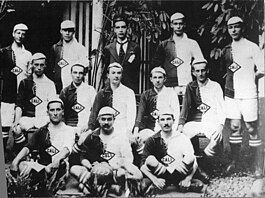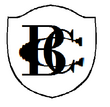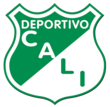Deportivo Cali
Palmira, Colombia | |||
| Capacity | 44,000 | ||
|---|---|---|---|
| Owner | 2,000 members | ||
| Chairman | Guido Jaramillo | ||
| Manager | Hernando Patiño (caretaker) | ||
| League | Categoría Primera A | ||
| 2023 | Primera A, 12th of 20 | ||
| Website | Club website | ||
|
| |||
Asociación Deportivo Cali, best known as Deportivo Cali, is a Colombian sports club based in Cali, most notable for its football team, which currently competes in the Categoría Primera A.
Deportivo Cali is one of the most successful football teams in Colombia, having won ten domestic league championships, one Copa Colombia and one Superliga Colombiana, for a total of twelve titles. Their stadium, Estadio Deportivo Cali, with an original capacity of 61,890, is the largest football stadium in Colombia, but has recently seen reductions in capacity due to renovations.
Deportivo Cali is the only Colombian football club that owns its own stadium, and the only club in Colombia to be owned by its fans.
History
Amateur era

Cali Football Club was formed in 1908 by students under the leadership of Nazario Lalinde, Juan Pablo Lalinde and Fidel Lalinde, who came back from Europe bringing football to the city of Cali, but in 1912 the students under the leadership of the three Lalinde brothers organized the team and renamed it as Deportivo Cali beginning practice under their first coach,

In 1945 several clubs decided to become part of the club adding new sports to the institution such as

Golden years
Between 1965 and 1974 Deportivo Cali saw its golden era. During this period, Deportivo Cali reached 11 finals, from which they won five of their nine Colombian championship titles in
During the 1980s, whilst América de Cali and Atlético Nacional started their emergence and consolidation as Colombian football powers, Deportivo Cali began to fall behind in championship titles and ended up as league runners-up behind its crosstown rival twice in a row, in 1985 and 1986. The key players for Deportivo Cali at the time were "El Pibe" Valderrama and Bernardo Redín, none of whom was able to win a title with the club.
In 1996, the club broke a 22-year domestic title drought under the guidance of coach
Deportivo Cali qualified for the
Recent years
In the start of the 21st century, the club has seen a major downfall in quality of players, quality of team and general managers, and overall results in both the
Uruguayan José Daniel Carreño took the reins ahead of the 2008 season, replacing Néstor Otero. Deportivo Cali, during his management, had an above average Apertura, coming in sixth place which qualified them for the semifinals of the tournament. In the Copa Colombia, the club ended in third place of its group and failed to qualify for further play, which was considered as an embarrassment as Deportivo Cali was the favorite to win the group. During the semifinals of the Apertura, Cali failed to win the first four matches, losing two and tying the remaining two. After failing to win the fourth game (a 2–0 loss to Deportes Quindío at home), Carreño was sacked and replaced by caretaker manager Ricardo Martínez, who managed the team until the end of the 2008 season and qualified it for the 2009 Copa Sudamericana, in which they were knocked out in the first stage by Universidad de Chile. The 2009 season saw Deportivo Cali qualifying for the semifinals of the Apertura tournament but missing out on the finals on goal difference, while in the Finalización tournament they failed to qualify for the semifinals.
In 2010, Deportivo Cali failed to qualify for the final rounds of both the Apertura and the Finalización, but was able to win the
In the 2011 Apertura, and despite having one of their worst starts in history by losing the first four games of the season, Deportivo Cali managed to make it to the quarterfinals, where they were eliminated in a penalty shoot-out by eventual champions Atlético Nacional in a match that could have gone either way. Deportivo Cali also competed in the 2011 Copa Sudamericana but were knocked out by Santa Fe on penalties, while in the Torneo Finalización they were unable to qualify for the semifinals. The 2012 season brought similar fortunes: the team qualified for the Apertura semifinals but narrowly missed out on the berth to the final, which ended up going to Deportivo Pasto, and in the Torneo Finalización they were placed in 11th place, thus failing to qualify for the semifinals.
The beginning of a new era
After the disappointing close to the season, Deportivo Cali decided to look for a new coach. On 13 December 2012, they signed Leonel Álvarez as their new head coach. He led Deportivo Cali to the play-offs in both of the tournaments played in 2013, reaching the final of the Torneo Finalización, but losing it to Atlético Nacional. The first leg was played on home soil resulting in a scoreless draw, while the second leg ended in a 2–0 loss. Deportivo Cali would go on to win the 2014 Superliga Colombiana against the same rival, however, Álvarez was fired after a poor start in the 2014 Apertura.
In recent years, the club has become stronger with the formation of young players. In
In
Crest history
Crest evolution

|

|

|

| |
| 1912–16 | 1916–26 | 1926–48 | 1948–2012 | 2012–present |
Rivalries
Clásico Vallecaucano
Deportivo Cali's longtime rival is
On 10 October 2010 Deportivo Cali and América de Cali played the first derby at the former's
- Total matches played: 317 [14]
- Deportivo Cali Victories: 119
- América de Cali Victories: 97
- Draws: 101
Clásico Añejo
Deportivo Cali also has a rivalry with Millonarios, which is known as the Clásico añejo (Vintage classic) since it was the first rivalry other than the regional derbies to be recognized as such in Colombian football.[15] The two sides played a tiebreaker series to decide the 1949 Campeonato Profesional champion, which ended up being Millonarios, and the rivalry was intensified in the 1960s and 1970s as Deportivo Cali began winning league titles and challenging Millonarios. Both sides have ended in the top two places of the league 10 times, and have also placed in the top two places of the all-time table of the Categoría Primera A, which as of 2022 is still led by Millonarios, with Deportivo Cali having been surpassed for second place by Atlético Nacional.[16] Although the rise and consolidation of Atlético Nacional and América de Cali starting from the 1980s has caused interest in this rivalry to decline somewhat, it is still considered an important match in Colombian football.
Stadium

Until 2014, Deportivo Cali played their home matches at Estadio Pascual Guerrero in Cali, which had a capacity of 43,000 and was shared with crosstown rivals América.[17] Although they opened their own Estadio Deportivo Cali in 2008 with a friendly match against Ecuadorian team LDU Quito and played some games there on a temporary basis due to renovations made to Estadio Pascual Guerrero for the 2011 FIFA U-20 World Cup, they moved into their stadium on a permanent basis starting from the 2015 season.[18] Estadio Deportivo Cali, also known as Estadio de Palmaseca, is located in Palmira, in the outskirts of Cali. When it opened, it had a capacity of 52,000, but renovations brought it down to 44,000.
Honours
| Type | Competition | Titles | Seasons |
|---|---|---|---|
| Domestic | Categoría Primera A | 10 | 1965, 1967, 1969, 1970, 1974, 1995–96, 1998, 2005–II, 2015–I, 2021–II |
| Copa Colombia | 1 | 2010 | |
| Superliga Colombiana | 1 | 2014 |
- record
- s shared record
Players
Current squad
Note: Flags indicate national team as defined under FIFA eligibility rules. Players may hold more than one non-FIFA nationality.
|
|
Out on loan
Note: Flags indicate national team as defined under FIFA eligibility rules. Players may hold more than one non-FIFA nationality.
|
|
World Cup players
The following players were chosen to represent their country at the FIFA World Cup while contracted to Deportivo Cali.
 Germán Aceros (1962)
Germán Aceros (1962) Buenaventura Ferreira (1986)
Buenaventura Ferreira (1986) Jorge Amado Nunes (1986)
Jorge Amado Nunes (1986) Bernardo Redín (1990)
Bernardo Redín (1990) John Wilmar Pérez (1998)
John Wilmar Pérez (1998) Juan Guillermo Castillo (2010)
Juan Guillermo Castillo (2010) Faryd Mondragón (2014)
Faryd Mondragón (2014) Abel Aguilar (2018)
Abel Aguilar (2018) Camilo Vargas (2018)
Camilo Vargas (2018)
Notable players
 Ernesto Álvarez
Ernesto Álvarez Alberto de Jesús Benítez
Alberto de Jesús Benítez Abel Da Graca
Abel Da Graca Rubén Darío Insúa
Rubén Darío Insúa Martín Morel
Martín Morel Cristian Nasuti
Cristian Nasuti Rubén Ponce de León
Rubén Ponce de León José Sand
José Sand Néstor Scotta
Néstor Scotta José Rosendo Toledo
José Rosendo Toledo Jorge Aravena
Jorge Aravena Jaime Riveros
Jaime Riveros Abel Aguilar
Abel Aguilar Adolfo Andrade
Adolfo Andrade Jairo Arboleda
Jairo Arboleda- Arley Betancourt
 Víctor Bonilla
Víctor Bonilla Rafael Santos Borré
Rafael Santos Borré Henry Caicedo
Henry Caicedo Miguel Calero
Miguel Calero Oswaldo Calero
Oswaldo Calero Mayer Candelo
Mayer Candelo Fernando Castro
Fernando Castro Óscar Córdoba
Óscar Córdoba Álvaro Domínguez
Álvaro Domínguez Walter Escobar
Walter Escobar Andrés Estrada
Andrés Estrada Carlos Estrada
Carlos Estrada Frank Fabra
Frank Fabra- Hermán Gaviria
 Teófilo Gutiérrez
Teófilo Gutiérrez Giovanni Hernández
Giovanni Hernández- Carlos Mario Hoyos
 Jhon Kennedy Hurtado
Jhon Kennedy Hurtado Edison Mafla
Edison Mafla Faryd Mondragón
Faryd Mondragón Fredy Montero
Fredy Montero Tressor Moreno
Tressor Moreno Luis Muriel
Luis Muriel Elkin Murillo
Elkin Murillo Jeison Murillo
Jeison Murillo Jámison Olave
Jámison Olave Willington Ortiz
Willington Ortiz Armando Osma
Armando Osma Ever Palacios
Ever Palacios Helibelton Palacios
Helibelton Palacios- Oscar Pareja
 Andrés Pérez
Andrés Pérez John Wilmar Pérez
John Wilmar Pérez Harold Preciado
Harold Preciado- Jorge Ramírez Gallego
 Bernardo Redín
Bernardo Redín- Hamilton Ricard
 Nelson Rivas
Nelson Rivas Hugo Rodallega
Hugo Rodallega- Ángel María Torres
 Diego Umaña
Diego Umaña Carlos Valderrama
Carlos Valderrama Camilo Vargas
Camilo Vargas Alexander Viveros
Alexander Viveros Mario Yepes
Mario Yepes- Cristian Zapata
 Pedro Zape
Pedro Zape Blas Pérez
Blas Pérez Arístides del Puerto
Arístides del Puerto Darío Caballero
Darío Caballero Roberto Fernández
Roberto Fernández Buenaventura Ferreira
Buenaventura Ferreira Jorge Amado Nunes
Jorge Amado Nunes Miguel Ángel Loayza
Miguel Ángel Loayza Valeriano López
Valeriano López Guillermo de Amores
Guillermo de Amores Ernesto Hernández
Ernesto Hernández- Juan Castillo
- Juan Salaberry
 Rafael Dudamel
Rafael Dudamel
Managers
Women
Deportivo Cali Femenino is the women's football section of Deportivo Cali and they currently play in the Colombian Women's Football League, the top level women's football league in Colombia. Founded in 2019, the club is one of four to have won the Colombian women's football league, winning the title in 2021 and having one runner-up finish the following season,[22] while also placing fourth at the 2022 Copa Libertadores Femenina.
References
- ^ "¿Cuáles son los grandes de Colombia?". Futbolred (in Spanish). 8 February 2011. Archived from the original on 3 May 2021. Retrieved 3 May 2021.
el único club que funciona como asociación es el Deportivo Cali
- ^ "Copa Libertadores 1978". RSSSF.com. Archived from the original on 15 August 2022. Retrieved 3 December 2022.
- ^ "Cali, entre los 50 clubes más valiosos de América, según Forbes". Archived from the original on 13 November 2016. Retrieved 12 November 2016.
- ^ "RSSSF statistics". Archived from the original on 14 March 2013. Retrieved 19 August 2008.
- ^ "Historia del Deportivo Cali". Archived from the original on 30 August 2008. Retrieved 20 August 2008.
- The Daily Herald. Archivedfrom the original on 22 July 2009. Retrieved 2 June 2009.
- ^ "Murió Herman "Carepa" Gavíria tras ser alcanzado por un rayo" [Herman "Carepa" Gaviria died after being hit by lightning] (in Spanish). Colombia.com. 24 October 2002. Archived from the original on 8 February 2010. Retrieved 28 February 2008.
- ^ "Deportivo Cali derrotó 2-0 al Quindío y le dio buen estreno a su estadio" (in Spanish). Futbolred.com. 21 February 2010. Archived from the original on 13 August 2018. Retrieved 12 August 2018.
- ^ "Deportivo Cali: Colombia's Cantera de Oro • Outside of the Boot". 23 December 2015. Archived from the original on 1 July 2016. Retrieved 3 June 2016.
- ^ "H2H Comparison Deportivo Cali". Soccerway. Archived from the original on 3 June 2016. Retrieved 9 September 2017.
- ^ "Cali, campeón: Así fue su campaña en la Liga BetPlay" (in Spanish). AS Colombia. 22 December 2021. Archived from the original on 23 December 2021. Retrieved 24 December 2021.
- ^ "Harold Preciado volvió recargado al Cali: ¡fue el artillero de la décima!" (in Spanish). AS Colombia. 23 December 2021. Archived from the original on 24 December 2021. Retrieved 24 December 2021.
- ^ "Primer Clasico (Español)". nuevoestadio.com. Archived from the original on 24 July 2008. Retrieved 20 August 2008.
- ^ "El Pais – Clasico Caleño". Retrieved 19 August 2008.[permanent dead link]
- ^ "Cali vs. Millonarios: recuerdos del clásico añejo del fútbol colombiano" [Cali vs. Millonarios: memories of the vintage classic of Colombian football] (in Spanish). El Espectador. 7 April 2022. Archived from the original on 24 July 2023. Retrieved 24 July 2023.
- ^ "¿Cali vs Millonarios, el clásico añejo? historia del fútbol colombiano" [Cali vs. Millonarios, the vintage classic? History of Colombian football] (in Spanish). Futbolred. 13 February 2022. Archived from the original on 24 July 2023. Retrieved 24 July 2023.
- ^ "Cali". FIFA (in Spanish). Archived from the original on 16 October 2010. Retrieved 2 August 2011.
- El País. 28 October 2018. Archivedfrom the original on 4 December 2022. Retrieved 4 December 2022.
- ^ "Primer Equipo". Deportivo Cali. Archived from the original on 24 October 2021. Retrieved 19 October 2021.
- ^ "Deportivo Cali". Dimayor. Archived from the original on 26 July 2019. Retrieved 20 July 2019.
- ^ "Plantel de Deportivo Cali". ESPN. Archived from the original on 27 November 2020. Retrieved 12 February 2021.
- ^ "América conquistó otro título femenino: ¿Quiénes comandan el palmarés?" [América conquered another women's title: Who commands the list of winners?] (in Spanish). Futbolred. 5 June 2022. Archived from the original on 13 November 2022. Retrieved 13 November 2022.
External links
- Official website
- Club profile at Dimayor
- Deportivo Cali at Soccerway
